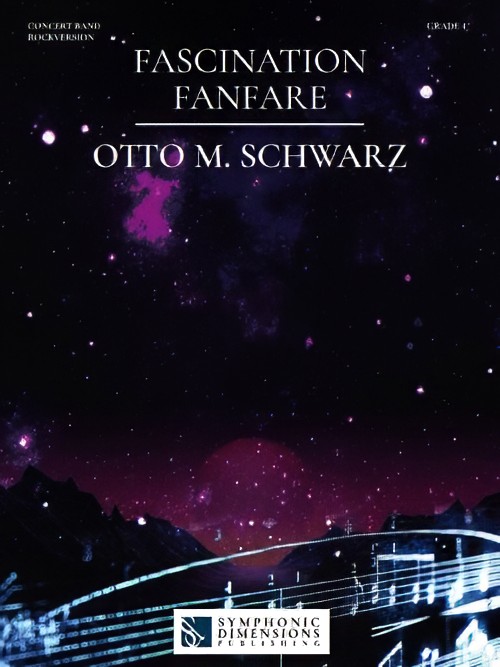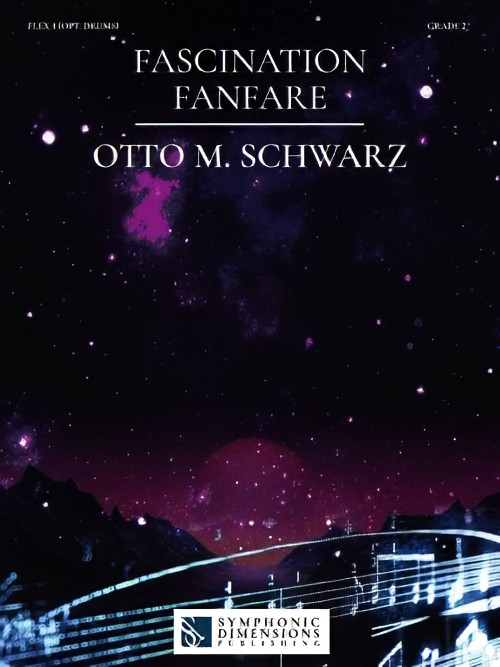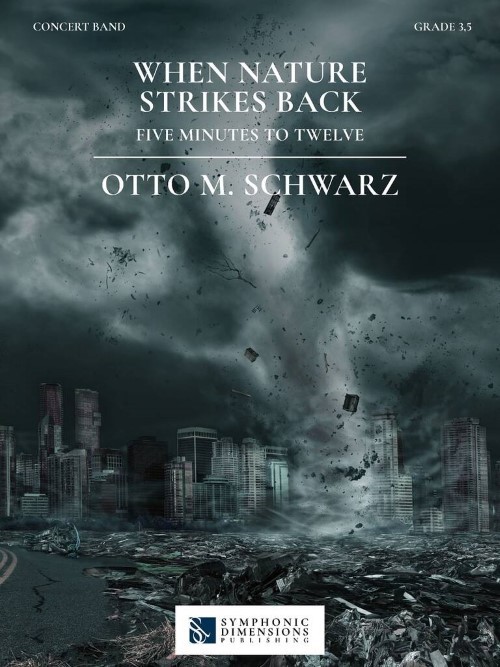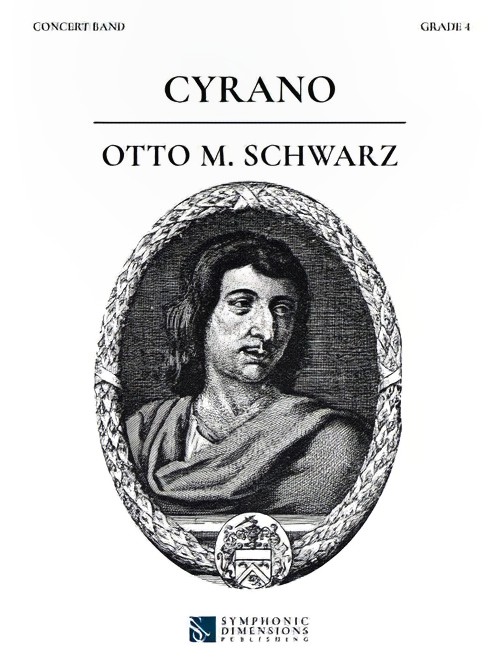Results
-
 £89.99
£89.99Fanfare for the Champions - Otto M. Schwarz
Fanfare for the Champions was commissioned by the municipal concert band of Landeck under the direction of Helmut Schmid on the occasion of the 375th anniversary of the band. The orchestra, which premiered Nostradamus (a key work of the composer), and which also commissioned Mantua - Freedom of the Eagle, has forged a friendship with the composer over a period of many years. This orchestra has participated in the major European competitions and has always performed with distinction--thus the title of the work Fanfare for the Champions.The fanfare, which is written in a style typical for the composer, should convey a feeling ofhappiness: the feeling to have created or accomplished something special. Don't resist that feeling!
Estimated dispatch 7-14 working days
-
 £94.99
£94.99Stratosphere - Otto M. Schwarz
What do the American Joseph Kittinger and the Austrian Felix Baumgartner have in common? They both jumped from over 30km high with a parachute. While Kittinger's attempt on 16 August 1960 was from a height of 'only' 31,333 meters, Felix Baumgartner broke this record on 14 October 2012 with a breath-taking 38,969 meters.This composition Stratosphere describes the adventure, from climbing into the capsule with help of a balloon, to the short pause in the stratosphere, and the jump, the turbulence during the free-fall descent, and finally the opening of the parachute and the safe landing.
Estimated dispatch 7-14 working days
-
 £84.99
£84.99Rondo Barocco - Otto M. Schwarz
The Baroque is a period of frills and ornaments, wether in architecture, painting or music. An easy melody passes through a variety of arrangements. From brass quintet and different tutti parts, all the sections are in action. Fortified by a drum set and an (optional) electric bass, the piece is given a modern touch and becomes more acceptable to the audience. A follow-up to "Rondo Romantica", this piece was composed in December 1997.
Estimated dispatch 7-14 working days
-
£118.99
Asteroid - Otto M. Schwarz
Asteroids and comets have played an important role throughout the history of life on earth. It is quite probable that the dinosaurs have been exterminated by an asteroid's impact in the Gulf of Mexico. Huge tidal waves and fire storms wiped out all life. This is the year 2067 according to the Christian calendar. A collision has just taken place in the asteroid belt between Mars and Jupiter and caused an asteroid to enter the earth's power of gravitation. It is instoppably approaching the blue planet. As its peoples have been fighting each other continuously, they missed the building of a global defence system against dangers coming from space. A scanner records the asteroid andimmediately sends a message to the President of the Anglo-American Union. The probability that the asteroid will hit the earth is judged 50% by the experts. Plans are made to shoot the celestial body with rockets live with hydrogen bombs or laser guns in order to throw it off its track, but they fail. The asteroid's size seems to threaten the existence of mankind. Those in the know stare at the night sky in bewilderment. But for the time being, there is still peace on earth....
Estimated dispatch 7-14 working days
-
 £84.99
£84.99See You! - Otto M. Schwarz
See You! is a little farewell song. Farewell scenes are a prominent part of the most touching elements of film music. Just think of the soundtrack to the great film Casablanca, which became famous overnight. "See You!" is not intended to be a permanent good-bye but more a 'see you soon'. It has been especially composed for young bands or smaller ensembles who want to try a more modern style of band music.
Estimated dispatch 7-14 working days
-
 £137.99
£137.99Welcome Overture - Otto M. Schwarz
Composed in commemoration of the 2006 Football World Cup. The World Cup is a global event that only takes place every four years and that is preceded by a number of qualifying rounds. In the actual event, the final tournament, only the best in the world meet. It is a special honor and responsibility to be the host of the final tournament. Welcome Overture musically expresses hospitality and warmth towards all people, regardless of colour or race; an attitude that is symbolic of the World Cup. A fantastic work that your audiences will enjoy time and time again.
Estimated dispatch 7-14 working days
-
 £100.80
£100.80Fascination Fanfare (Concert Band - Score and Parts) - Schwarz, Otto M.
Rock VersionFascination Fanfare is a hymn to passion, to fascination and to generations of music lovers! This dynamic fanfare is a rousing work full of catchy melodies and enthralling sounds. This opening work and the musical signature tune it contains were commissioned by the Austrian Brass Band Association and will be heard, among other things, at public events as a musical calling card.Duration: 3.15
Estimated dispatch 7-14 working days
-
 £63.99
£63.99Fascination Fanfare (Flexible Ensemble - Score and Parts) - Schwarz, Otto M.
Fascination Fanfare is a hymn to passion, to fascination and to generations of music lovers! This dynamic fanfare is a rousing work full of catchy melodies and enthralling sounds. This opening work and the musical signature tune it contains were commissioned by the Austrian Brass Band Association and will be heard, among other things, at public events as a musical calling card.Duration: 3.00
Estimated dispatch 7-14 working days
-
 £139.99
£139.99When Nature Strikes Back (Concert Band - Score and Parts) - Schwarz, Otto M.
Ice ages, warm periods, impacts by asteroids - the climate on our planet has always been in a state flux. The difference to the past is that since the industrial revolution, the changes are now also increasingly caused by human activity. The release of greenhouse gases in particular promotes the warming of the atmosphere and the oceans. Some experts even predict an increase of up to 4.8 degrees by the end of the 21st century. The result of such a development, apart from environmental catastrophes that are difficult to predict, would be a gigantic migration of populations. CO2 emissions must be reduced: it is five minutes to twelve. The harbingers of disaster have already reached us.Duration: 8.00
Estimated dispatch 7-14 working days
-
 £139.99
£139.99Cyrano (Concert Band - Score and Parts) - Schwarz, Otto M.
What are the true qualities of a person? Outward beauty or inner values? Or perhaps a balance of the two? This question has probably been posed by everyone at some time or another, and the answer is as challenging as it is subjective. This is also the theme of this work. The poet and soldier Cyrano de Bergerac is known for his big nose and his great intellect. The 17th century novelist harbours feelings for the beautiful Roxane but is sure that this love will never be reciprocated. Roxane herself falls in love with the cadet Christian de Neuvillette, who is certainly handsome but could be described as stupid. Cyrano de Bergerac writes love poems on behalf of Christian to win Roxane's heart. And then there is the Count Guiche, who is married but also wants to make her his mistress. Christian and Roxane eventually marry and the furious Count Guiche sends Christian and Cyrano, who serve together in the Captains of Gascony regiment, to the front and, some months later, on a suicide mission. Shortly before the battle, Roxane confesses to her husband that she no longer loves him so much for his beauty as for his inner values. Christian is dismayed and begs Cyrano to tell Roxane the truth, but he can't bring himself to do so. Christian de Neuvillette dies in battle and Cyrano de Bergerac remains silent about the true provenance of the letters. Only much later does the truth come to light: scarred by the war, Cyrano visits Roxane in the convent where she has been living since Christian's death and confesses his love for her. He ultimately dies in Roxane's arms.Duration: 8.30
Estimated dispatch 7-14 working days
